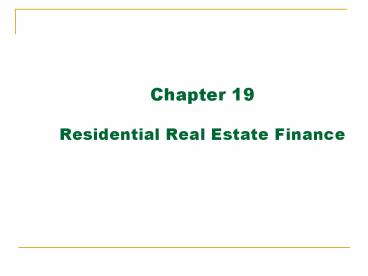Chapter 19 Residential Real Estate Finance - PowerPoint PPT Presentation
1 / 23
Title:
Chapter 19 Residential Real Estate Finance
Description:
... to guarantee 'pass-through' mortgage-backed securities based on FHA and VA loans ... Mortgage-Backed Securities. Multiple mortgage loans in a single pool or fund ... – PowerPoint PPT presentation
Number of Views:182
Avg rating:3.0/5.0
Title: Chapter 19 Residential Real Estate Finance
1
Chapter 19Residential Real Estate Finance
2
Major Topics
- Primary and secondary mortgage markets
- Conventional, FHA and VA mortgages
- The Effect of Points on Mortgage Choice
- Mortgage Underwriting Criteria
3
Changes in Financing
- More loan types
- Secondary mortgage market and loan
securitization - Easier to qualify
4
Mortgage Markets
- Primary market loans are created
- Borrowers and lenders
- Secondary market loans are sold/securitized
- FNMA, GNMA, life insurance companies, pension
funds
5
Secondary Mortgage Market
- Fannie Mae (1968) Spun from HUD to become a
primary purchaser of FHA and VA mortgage loans - Ginnie Mae (1968) Empowered to guarantee
pass-through mortgage-backed securities based
on FHA and VA loans - Freddie Mac (1970) Formed to purchase and
securitize conventional home loans from savings
associations
6
Fannie Mae
- Original mission Secondary market for FHA/VA
- Now privately owned but still under U.S. charter
- Public mission for housing
- U.S. Treasury financial credit line available
- Surpasses Freddie Mac in buying conventional
loans - Has securitized and sold, or owns, about 25 of
outstanding home loans
7
Freddie Mac
- Has congressional charter
- Deals exclusively in conventional loans
- Securitized all loans purchased until recent
years - Has securitized and sold, or owns, about 18 of
outstanding home loans
8
Importance of Fannie Maeand Freddie Mac
- Have brought about standardization in
- Mortgages and mortgage notes
- Appraisal forms and practices
- Underwriting procedures and standards
- Have increased liquidity of mortgage markets
- No interstate differentials in mortgage interest
rates - No mortgage lending interruptions when interest
rates rise - New sources of mortgage funds through security
investors
9
Secondary Mortgage Market
- Other benefits
- 1. R risk shifted (some)
- 2. More funds available for lending
(liquidity) - 3. Geographic diversification
10
Ginnie Mae
- Does not buy mortgages
- Guarantees timely payment of interest and
principal to holders of GNMA securities. - Guarantees only securities based on FHA/VA loans
- Why necessary if already insured?
11
Mortgage-Backed Securities
- Multiple mortgage loans in a single pool or fund
- Security entitles investor to pro rata share of
all cash flows - Loans in a given pool will be similar
- FHA/VA conventional
- Same vintage (new or recent loans)
- Similar interest rates
- Nearly two-thirds of all new home loans have been
securitized in recent years
12
Pass-through Securities
- Issued by investment bank, originator, or FNMA,
FHLMC - Security ownership rights to pool of mortgage
- Minimum pool size usually 100M
- CFs from pool (less fees) are passed-through to
investors
13
Pass-through Securities
- Pass-through risk
- 1. No default risk
- 2. R risk
- 3. Prepayment risk
14
(No Transcript)
15
Conventional Loans
- Conforming conventional home loan Meets the
requirements for purchase by Freddie Mac or
Fannie Mae - Standard note
- Standard mortgage
- Standard appraisal
- Size limit Currently 417K
- Interest rate advantage due to liquidity (at
least .25) - Nonconforming loan Does not meet Fannie
requirements in some respect - Jumbo Nonconforming in terms of size (currently
417K) - http//www.bankrate.com/brm/news/mtg/mtg_blurbs/ra
tes.asp
16
Private MortgageInsurance (PMI)
- Protects lender against losses due to default
- Generally required for loans with Loan-to-Value
ratio 80 - Protects lender for losses up to 20 of loan
- Example terms
- 2.5 percent of loan in single up-front premium
- 0.5 percent annual premium (0.041 per month)
17
PMI
- Termination may be allowed if LTV ratio falls
below 80 of current value and borrower is in
good standing - Must allow termination when loan falls to 80 of
original value (Homeowners Insurance Act of
1999) - Obligation to terminate when loan falls to 78 of
original value
18
PMI Example
- House price 100,000
- Loan amount 95,000
- PMI, insuring top 20 First 19,000 in losses
- Borrower pays down loan to 94,000
- Defaults Foreclosure sale at 90,000
- Lenders loss 94,000 90,000 4,000
- With loss less than 19,000, PMI covers it
completely
19
FHA-Insured Mortgages
- FHA is strictly a loan insurance program
- Loans are from private lenders
- Max
- 3 minimum down payment required
- 97.75 maximum
- Insures 100 of loan
- After foreclosure, title is transferred to
Housing and Urban Development (HUD) - Premiums
- Up-front premium 1.50, which can be included in
loan - Yearly 0.50
20
Underwriting
- Why default?
- Cant afford to pay
- Negative equity
- Traditional underwriting
- Income Ratios
- Housing expense ratio PITI Monthly Income
- Total expense ratio Total payments Monthly
Income - FNMA required 28, 36 max for fixed rate loans
- Loan-to-Value ratio
21
Assessing the probability of default
- 5 major criteria
- Income
- Other Debt Obligations
- Housing Expenses
- Credit Evaluation
- Net Worth
- Creation of single statistical score
22
Email from a mortgage lender
- Nah, not really. We have a Fast and Easy
(reduced documentation, no income or asset
verification) that allows 55! People really max
it out sometimes. Minimum requirement is 680
FICO and 10 down. That 36 stretches out
with ARMs and stuff like that, too. If somebody
has like 42 with a lot of reserves, that'll go
through. Usually 45 is the benchmark, with a
"speed limit" of 48-49, sometimes 50 depending
on credit and reserves. I can get anyone
approved. Sincerely,Val
23
END































